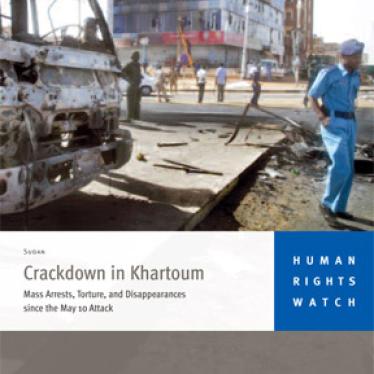The Sudanese government should immediately account for the hundreds of men, women, and children arrested in Khartoum since a rebel attack on the capital in May 2008, Human Rights Watch said in a new report released today. The government should also bring to justice those responsible for the torture and mistreatment of detainees.
The 28-page report, “Crackdown in Khartoum: Mass Arrests, Torture, and Disappearances Since the May 10 Attack,” documents Sudanese government repression in Khartoum following the May 10 attack by the Darfur-based rebel group, the Justice and Equality Movement (JEM). Eyewitnesses suggest that more than 60 civilians were killed during the fighting. The government has detained hundreds of people but has provided no information on their identities, whereabouts, or any charges against them. Most of the people arrested were, or appeared to be, from Sudan’s Darfur region, indicative of a discriminatory intent.
“Hundreds of people in Khartoum have been rounded up because they are from Darfur, and brutally beaten and thrown into overcrowded jails where some have died,” said Georgette Gagnon, Africa director at Human Rights Watch. “The Sudanese authorities should account for every individual and charge them with a cognizable crime or immediately release them.”
“Crackdown in Khartoum” is based on more than 30 interviews conducted by Human Rights Watch in May 2008, including interviews with released detainees and relatives of people who have been “disappeared.” Human Right Watch has collected the names of more than 200 people whom the Sudanese National Intelligence Security Services (NISS) are believed to have arrested since May 10. Some former detainees claimed that the total number of those arrested may be as high as 3,000.
Eyewitnesses reported to Human Rights Watch the deaths of at least 10 people in detention from ill-treatment and poor conditions in prisons and secret detention centers. In a large number of cases, the Sudanese government has provided no information on the identities of individuals arrested, their whereabouts, or the charges against them – a practice that amounts to an enforced disappearance in violation of international law.
One released detainee told Human Rights Watch:
“During [the six days in detention] some people were taken away for questioning and were tortured, and some of them never came back. One of the methods used to torture people was to make them balance on their knees and elbows on the concrete floor out in the sun for hours, which burns after awhile. Every day, two to three people die in the prison because of lack of food and water or the torture.”
Censorship of Sudanese media and persecution of journalists and human rights defenders have also increased in the aftermath of the May 10 attack. Authorities have prevented newspapers from publishing articles that are seen as critical of the government, including its role in the May 10 events, the ongoing arrests, and other topics regarded as sensitive to the authorities, such as Darfur and recent fighting in Abyei, a disputed oil-rich area on the border between north and south Sudan.
“Cracking down on rights activists and journalists shows Khartoum’s contempt for freedom of expression,” said Gagnon. “Authorities should stop harassing journalists and human rights defenders.”
Human Right Watch urged the international community to immediately and publicly call on Sudan to end all arbitrary arrests and detention; promptly release all detainees for whom there is no legal basis for detention, or charge them with a legally cognizable offense; inform the detainees’ families of their whereabouts; and immediately end all use of torture and other mistreatment of detainees.







